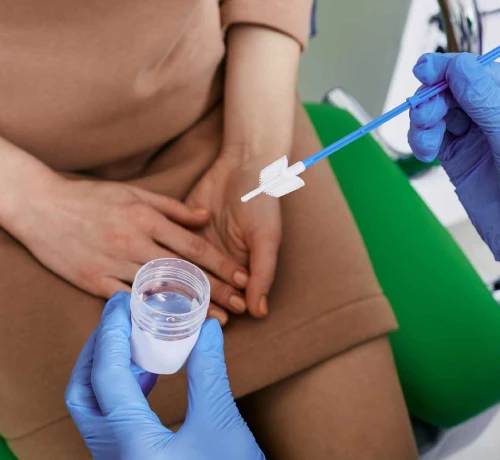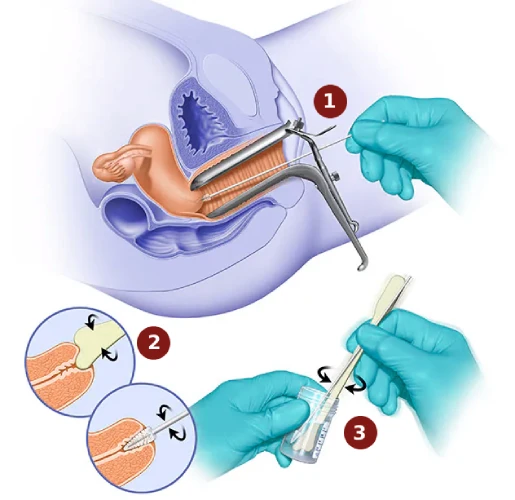pap smear test in thane ( CERVICAL CANCER )
Pap smear stands for Papanicolaou smear, named after Dr George Papanicolaou, who developed the test. A Pap smear, also known as a Pap test, is a simple and quick medical procedure where a small sample of cells is taken from the cervix. This test helps detect any abnormal changes in these cells, which could indicate conditions like infections, pre-cancerous changes, or even cervical cancer in its early stages.
Getting regular Pap smear tests in Thane with Dr Aditi Godbole, a trusted and experienced gynecologist, is essential. With Dr Aditi Godbole’s expertise, you can ensure your cervical health is in safe hands.
What is a Pap Smear Test?
It’s a simple procedure that involves collecting cells from your cervix to detect any abnormalities or signs of cervical cancer. This test can identify abnormal cells early, even before they develop into cancer. Early detection makes treatment easier and more effective, potentially saving lives.
Pap smear test involves:
– The doctor gently inserted a speculum to widen the vagina.
– Using a soft brush to collect cervical cells.
– Sending the sample to a lab for analysis.
Common Questions About Pap Smear Tests
How Much Does a Pap Smear Cost?
The cost of a Pap smear test varies depending on the location and the facility where it is performed. On average, the price of a Pap smear test typically ranges between ₹900 and ₹1000.
Is a Pap Smear Test Very Painful?
A Pap smear test is not painful for most women. You may feel slight pressure or discomfort when the speculum is inserted, but it lasts only a few seconds.
Can I Get a Pap Smear During My Period?
It is recommended to avoid scheduling a Pap smear during your period. Blood can interfere with the test results. Try to schedule it at least 5 days after your period ends.
Is a Pap Smear Compulsory?
While not mandatory, a Pap smear is highly recommended for women starting at age 21 or earlier if sexually active. It is a proactive step in preventing cervical cancer.
Do You Need a Pap Smear If Not Sexually Active?
If you’ve never been sexually active, your doctor may not recommend a Pap smear. However, discuss your individual risks with your gynecologist.
Pap Smear Guidelines for Women
At What Age Should a Woman Get a Pap Smear?
It is recommended that women start getting Pap smear tests at the age of 21.
Ages 21–29: A Pap smear should be done once every 3 years.
Ages 30–65: You can opt for a Pap smear combined with an HPV test (co-testing) every 5 years, a Pap smear alone every 3 years, or an HPV test alone every 5 years.
Do You Need a Pap Smear If You Are Not Sexually Active?
Yes. Doctors recommend routine cervical cancer screening, regardless of your sexual history.
Diseases Detected Through Pap Smear
The Pap Smear Procedure: What to Expect?
During a Pap smear, you’ll lie back on an examination table as your doctor gently inserts a speculum into your vagina to visualize your cervix. Next, a small brush or spatula is used to collect cells from the surface of your cervix, which are then sent to a laboratory for analysis.
Safety and Risks
Pap smear tests are generally safe, with minimal discomfort or risks involved. However, some women may experience mild cramping or spotting afterward. Rest assured, your doctor takes all necessary precautions to ensure your comfort and safety throughout the procedure.
With Dr Aditi Godbole by your side, you’re in expert hands. Her years of experience and compassionate approach ensure you receive the highest standard of care during your Pap smear test and cervical screening journey.
Why Cervical Screening Matters?
Cervical screening is essential for detecting abnormalities early, allowing for prompt treatment and reducing the risk of cervical cancer. By staying proactive about your cervical health, you can safeguard your well-being and enjoy peace of mind.
Comprehensive Cervical Cancer Screening
In addition to Pap smear tests, cervical cancer screening may also include:
HPV Test: This test detects the presence of high-risk strains of the human papillomavirus (HPV), which can increase your risk of cervical cancer. It’s often performed in conjunction with a Pap smear for comprehensive screening.
Patient Testimonials
Schedule your Pap smear test with Dr Aditi Godbole, an expert in cervical cancer screening in Thane. Call +91 77158 88289 or book online now!


